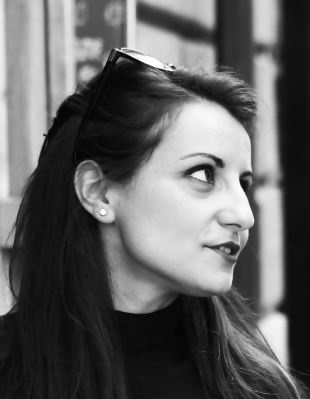Post date:
Simona grew up in Genoa, Italy, where she developed an early passion for languages. Motivated to find a challenge which would provide a ‘new insight into the world’ as well as more language practice, Simona enrolled in Marine Engineering and Naval Architecture at the University of Genoa which included an Erasmus year studying at the University of A Coruña in Ferrol, Spain.
Next came a Masters in Marine Engineering and Naval Architecture at the University of Trieste, Italy, during which Simona moved to Texel in the Netherlands to write her thesis at the Royal Netherlands Institute for Sea Research (NIOZ).
It was during her time in the Netherlands that Simona’s interests crystallised around physical oceanography, which led to another move – this time to the UK, to study for her PhD at the National Oceanography Centre in Southampton with sponsorship from the Italian National Research Council Institute of Marine Sciences.
In early 2018 Simona moved to the University of Edinburgh where she holds a PDRA position in the Soft Systems Group and currently works on the award-winning £36M ORCA Hub programme. ORCA Hub is aimed at realising the offshore energy industry's vision for a completely autonomous offshore energy field.
What sparked your interest in engineering? Is it the same thing that inspires you today?
My understanding of engineering changed over time – and over several different countries!
At the beginning, engineering was an exciting challenge, and seemed the key to opening many doors. Today, engineering is the framework for my research. It provides the language to translate theoretical work into physical results. I think that through engineering, science becomes tangible and relatable to the world.
How would you explain your research in a nutshell?
My research has one constant: the ocean. Countless tools help me/us to understand the role of the ocean in the environmental equilibrium. This is particularly important today, in the era of climate change. Another important point for environmental protection and technological progress is automation.
Within the project I’m working on, ORCA Hub, brand new technologies are brought to life, many of them intended for use in harsh offshore environments to render offshore assets more secure for personnel and the environment.
I use ocean/off-shore data, to identify and monitor different processes on offshore assets, in the ocean and stemming from the interaction between the two. I particularly enjoy investigating long time series, which have the potential to reveal long-term patterns in the evolution of the world’s ocean and offshore structure health. Data is a critical tool in climate investigation and prediction as well as in structure prognostic and monitoring.
My present research is therefore characterised by this dual identity, entailing ocean science and offshore structures engineering. Could this be Ocean Engineering? I think so…
What have been the highlights and challenges of your career in engineering so far?
During my PhD I spent more than six months on board oceanographic vessels. You could say that these six months, spread over roughly four years, three different seas, five ships and four countries, were a highlight!
Juggling different aspects of science has been, and still is, a fun challenge. Communicating with experts in different fields is also a challenge. Perhaps my favourite challenge is translating technology from the industrial to the scientific domain.
Science and engineering might be many things, but they are certainly not monotonous! Building a career in these fields requires a high level of autonomy, resilience, organisation, time management, and communication skills.
Do you have any advice for the next generation of women interested in getting into engineering?
Be confident. Do not let engineering intimidate you. Find what you like and go for it.
Be prepared to work hard and always, always, always keep learning.
Related information
-
Find out more about Dr Simona Aracri's research on the Soft Systems Group website



